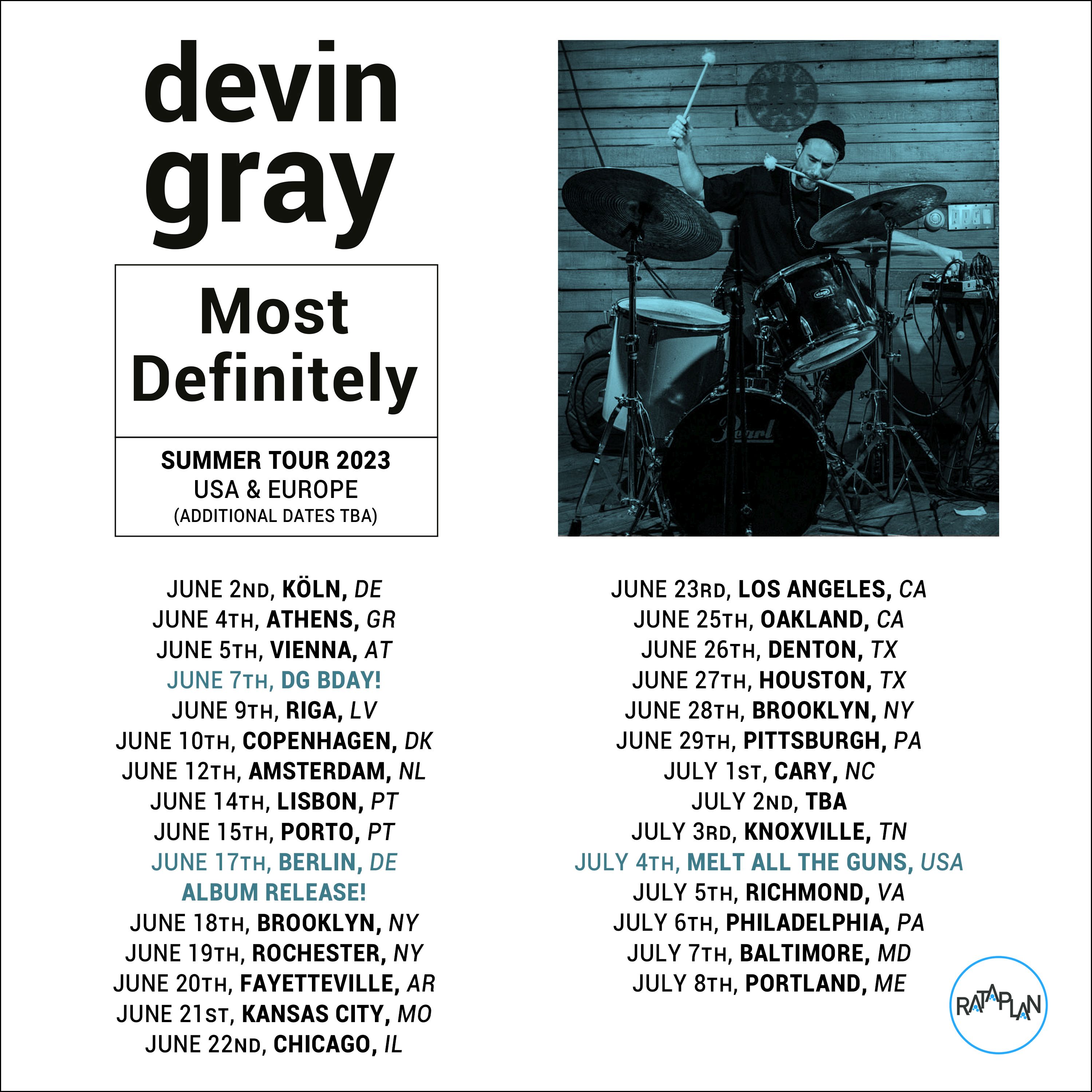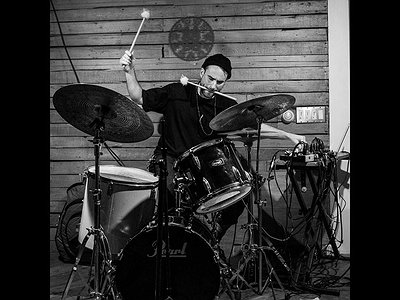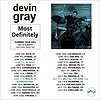Name: Devin Gray
Occupation: Drummer, composer, bandleader
Nationality: American
Current release: Devin Gray's debut solo full-length Most Definitely is out June 9th via Rataplan.
Recommendations: Book= Freeplay; Art= Bart Vandevijvere
If you enjoyed this Devin Gray interview and would like to know more about his music and current tour dates, visit his official website. He is also on Instagram, and twitter.
Over the course of his career, Devin Gray has collaborated with a wide range of artists, including Jessica Pavone, Wendy Eisenberg, Nate Wooley, Satoko Fujii, and Gerald Cleaver.
[Read our Jessica Pavone interview]
[Read our Wendy Eisenberg interview]
[Read our Gerald Cleaver interview]
[Read our Nate Wooley interview]
[Read our Satoko Fujii interview]
When I listen to music, I see shapes, objects and colours. What happens in your body when you're listening? Do you listen with your eyes open or closed?
Love listening, it's my absolute favorite thing to do!
Though there are so many different states of listening it depends on which one we’re talking about. But let's use two examples, first is listening to a recording with full attention, second is listening while playing music.
Oh wait, it's the same answer, close your eyes, open up, relax and dig in deep to the feeling!
What were your very first steps in music like - and how do you rate gains made through experience versus the naiveté of those first steps?
My first steps were feeling the sound of music resonating so strongly in my body that I had to make rhythm with my body in reaction. Not just as a baby, but also now still as a grown adult!
The vibration and power of music is such a special thing, it's unlike anything else.
According to scientific studies, we make our deepest and most incisive musical experiences between the ages of 13-16. What did music meant to you at that age and what’s changed since then?
Actually, I'm not sure much has changed.
I think at that early age music was just calling me so strongly to play, and I’ve made it my life's work since then, so I won’t be changing that anytime soon!
If any, I think the only difference now is that there are much more parts around the music, good and bad, which make doing music just a lot of work.
Over the course of your development, what have been your most important instruments and tools and how have they shaped your perspective on music?
I’d say piano, vibraphone, music school, friends, and a music notation software really helped me reflect more quickly on how music was or wasn't working. It really opened my ears even further.
What, would you say, are the key ideas behind your approach to music and what motivates you to create?
My main focus is to approach every situation as an improviser in the sense of making whatever the music is happening the best I possibly can.
I’ve been called a situationist before, because I love navigating new music all the time, though that can be extremely exhausting. But I think that’s what makes me love it even more!
People motivate me to create! Simple honest inspiration! 
Paul Simon said “the way that I listen to my own records is not for the chords or the lyrics - my first impression is of the overall sound.” What's your own take on that and how would you define your personal sound?
I used to listen to Paul Simon a lot growing up actually, you know the whole Steve Gadd thing, and some of those African vibe records were quite interesting to my early ears (10-14).
I’m not really interested in listening to my own records, or sound actually. I’m mostly focused on making it feel the way I want it to. If I listen to something of my own it's usually to double check on some concept to see if I can improve on it, or take it a new way, or to make sure the playing is honest.
Ok, if I have to define my sound I’d say it's a strong mix of spiky, and smooth.
Sound, song, and rhythm are all around us, from animal noises to the waves of the ocean. What, if any, are some of the most moving experiences you've had with these non-human-made sounds? In how far would you describe them as “musical”?
I believe that all sounds are musical, it’s just about the context, and level of imagination one brings to it.
Growing up in Maine there are a lot of beautiful natural sounds, something about the middle of the night sounds when you are deep in the forest that still really makes me sing.
Then again that mixed with living in New York City for so long, can really bring out the love for metal on metal of the MTA’s trains in your brain, to form a completely different approach to hearing, or losing hearing should I say.
From very deep/high/loud/quiet sounds to very long/short/simple/complex compositions - are there extremes in music you feel drawn to and what response do they elicit?
Love all extremes - in music as well, and of course as a drummer I love dynamics and love playing with this in mind - so to try to keep myself and audiences engaged.
From symphonies and traditional verse/chorus-songs to linear techno tracks and free jazz, there are myriads ways to structure a piece of music. Which approaches work best for you – and why?
As a composer it really just depends on who I’m writing for at that moment. As an improviser, well actually it's the same. It really just depends on who I’m working with!
But in short, I love all of it!
Could you describe your creative process on the basis of one of your pieces, live performances or albums that's particularly dear to you, please?
Take “Bad WiFi” from my solo record Most Definitely that comes out June 9th!
This piece is really short, but it started from an improvisational idea, and then we basically recomposed it in the studio to almost just speed it up and add layers and some breaks to give it all the fun chop that you hear today.
Sometimes, science and art converge in unexpected ways. Do you conduct “experiments” or make use of scientific insights when you're making music?
I don't think of music directly in terms of science, but rather in terms of music to help bring more music. I put a lot of pressure on myself to try to hear as much as possible of every situation every time, to keep my ears open, so I am hopefully not “missing” some music.
In the end, improvisation is an experiment with sound every time, love it.
How does the way you make music reflect the way you live your life? Can we learn lessons about life by understanding music on a deeper level?
Music has taught me SO much. I think the most important thing is patience.
Music forces you (if you take it seriously) to really realize that there is something WAY bigger than yourself out there, and that is a lesson that I love to keep learning as well as try to share that with my music to anyone who's willing to listen.
Do you feel as though writing or performing a piece of music is inherently different from something like making a great cup of coffee? What do you express through music that you couldn't or wouldn't in more 'mundane' tasks?
Coffee is easy, though it tastes great (most of the time).
Composing music is like building your own house, and don’t you want it to look great? Or at least cool or respectable for your friends? Or even, something that keeps the heat inside or doesn't fall down - dig?
Every time I listen to "Albedo 0.39" by Vangelis, I choke up. But the lyrics are made up of nothing but numbers and values. Do you, too, have a song or piece of music that affects you in a way that you can't explain?
Oh gosh, so many songs … Perhaps some Bach harpsichord pieces can really grab me still
If you could make a wish for the future – what are developments in music you would like to see and hear?
I already see lots of developments in music, actually tons.
What I would like to see is for musicians to not have to struggle so hard to continue to be artists in our world. It's one thing to talk about buying music, but it's another to keep focus on the musical work, and not just looking for grants types of things all the time to stay alive.
So, more music time as a development for all musical artists.





